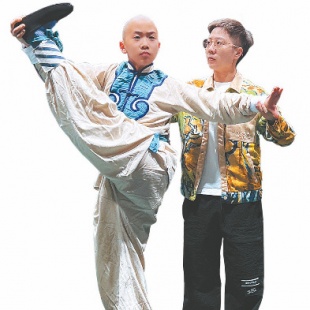Head over heels for Peking Opera


Peking Opera, also known as jingju in Chinese, was listed as an Intangible Cultural Heritage of Humanity by UNESCO in 2010.
In 1790, when four Hui Opera troupes visited Beijing as part of celebrations for the 80th birthday of Emperor Qianlong (1711-99), they stayed in the south of the city. Hui Opera, or huiju, a form of opera from Anhui province, provided the foundations of Peking Opera.
In about 1840, Peking Opera began to formally take shape, growing rapidly during the time of Empress Dowager Cixi (1835-1908), a Chinese opera lover. The art form went from strength to strength, with troupes being formed in Beijing, Tianjin and Shanghai. Peking Opera had its heyday in the 1920s and 1930s, with star performers popularizing the art form across the country and abroad.
A popular Chinese saying sums up the rigorous training required for Peking Opera thus: "One minute of performance requires 10 years of practice". The highly stylized ancient Chinese art form, with a history of more than 200 years, combines music, dance, drama, acrobatics and martial arts.
"Many teenagers Guo's age are more familiar with pop music, movies and computer games. But the students at the Beijing Opera Art's College, such as Guo, practice the ancient art form every day and will grow into professional performers. They will keep traditional Chinese operas alive," says Wang.
At 31, Wang also specializes in playing the role of laosheng.
She recalls that when she was a child, her mother took her to the park near her home. Instead of playing with other kids, she enjoyed watching senior people singing Peking Opera.
Wang was also trained at the Beijing Opera Art's College and then furthered her study at the National Academy of Chinese Theatre Arts, where she graduated in 2013. The same year, she returned to the Beijing Opera Art's College and became a Peking Opera teacher.
"It takes so long to train and it is difficult to achieve fame, but knowing that we are keeping a unique tradition alive is what drives us," she says.
"I became a student at the college in 1975 and I have many beautiful memories here," says Xu Di, a veteran Quju Opera actress, who has also built a large fan base by playing roles in movies and TV dramas. "The sophisticated ancient art form is the essence of Chinese culture. The acting skills I learned at the school laid a solid foundation for my roles in movies and TV dramas. I am still performing in Quju Opera productions, which form my roots as an actress."
Contact the writer at chennan@chinadaily.com.cn





































